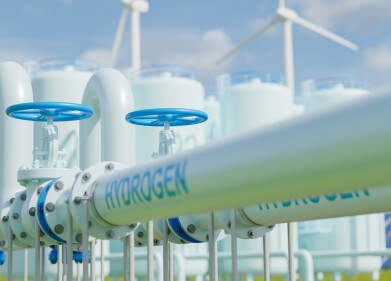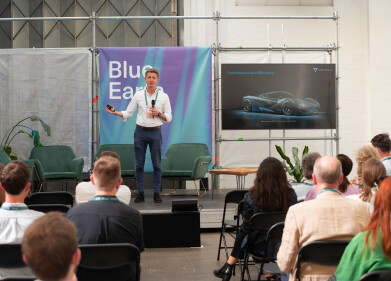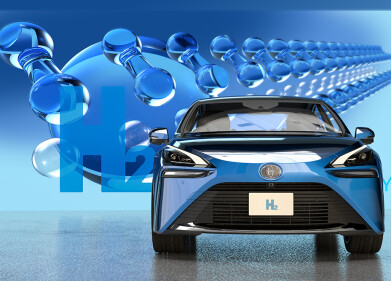Hydrogen fuel
First paper mill in UK powered by hydrogen to trial in 2024
Jul 24 2023
The paper industry has long been associated with high carbon emissions, but Essity, a leading global hygiene and health company, is determined to change that. Through their commitment to sustainability and cutting-edge innovation, Essity is set to become the UK's first paper mill to harness the power of hydrogen for production. This groundbreaking endeavour is expected to significantly reduce CO2 emissions and revolutionize the way toilet paper and kitchen towel are manufactured.
In 2024, Essity's Tawd Mill in Skelmersdale, Lancashire, will undergo a trial to replace a portion of its drying process, which currently relies on natural gas, with hydrogen. The shift from natural gas to low-carbon hydrogen is projected to result in a remarkable 66 percent reduction in total CO2 emissions. The trial secured funding as part of the UK Government's £55 million Industrial Fuel Switching Programme, an initiative aimed at exploring alternative fuel sources for industries to achieve the nation's Net Zero ambitions.
Essity's ambitious environmental targets include a commitment to reduce their carbon emissions by 35 percent by 2030, ultimately reaching net-zero emissions by 2050. The adoption of hydrogen as an alternative fuel aligns perfectly with these goals, offering a step in the right direction for the company's journey toward sustainability.
Spokesman Gareth Lucy expressed his excitement about Essity's pioneering efforts, stating that the company is thrilled to lead the way toward a more eco-friendly approach to producing essential paper products. The trial will be closely monitored, focusing on energy consumption, emissions, machine performance, and product quality. The data collected will serve as valuable insights for a potential permanent transition to hydrogen-based production.
While the Tawd Mill trial is a significant milestone, it's not Essity's first foray into hydrogen-powered paper production. In Mainz-Kostheim, Germany, the company successfully carried out a pilot project in the second half of 2021, making Essity the first in the industry to produce tissue using a CO2 emission-free production process fuelled by renewable hydrogen. The pilot, which integrated hydrogen into the paper drying process, showcased Essity's dedication to pioneering sustainable practices in the field.
Essity's dedication to environmental consciousness extends beyond its own facilities. The company has partnered with Progressive Energy Ltd, an organization with experience in delivering hydrogen demonstrations and linked to HyNet North West, a leading industrial decarbonization project in the UK. The collaboration will aid the installation of burners that can operate on both natural gas and hydrogen, facilitating testing and future adoption of hydrogen as a viable fuel source.
The potential for widespread implementation is immense. If the Tawd Mill trial proves successful, hydrogen-based production could be adopted permanently not only at the Skelmersdale site but also at other Essity production locations, including Trafford Park and Oakenholt.
Essity's ambitious vision for hydrogen in the paper industry is a remarkable example of corporate responsibility and environmental stewardship. Their commitment to exploring innovative solutions to reduce the industry's carbon footprint could have far-reaching impacts beyond the company itself. As one of the largest manufacturers of premium TAD tissue paper in the UK, Essity's shift to hydrogen-powered production could set a new benchmark for the entire industry.
Hydrogen power presents a promising solution for reducing the carbon footprint of the paper industry. As evidenced by Essity's pilot project in Germany, the switch from natural gas to hydrogen can lead to CO2 emission-free production processes. While hydrogen is a clean energy source when burned, the key to its sustainability lies in producing it through renewable means. Green hydrogen, generated by using renewable energy for water electrolysis, is a viable carbon-neutral option, while blue hydrogen, produced from natural gas with CO2 capture and storage, remains a lower-carbon alternative but not entirely emission-free.
The success of Essity's hydrogen-powered paper mill trial in 2024 could be a major milestone for the paper industry's sustainability journey. If adopted on a larger scale, hydrogen-based production could significantly contribute to reducing the sector's carbon emissions and setting a new standard for eco-friendly paper manufacturing. As industries worldwide strive to achieve their own net-zero goals, Essity stands out as a beacon of environmental leadership and innovation. By pioneering the use of hydrogen in paper production, Essity is not only transforming the way we make everyday paper products but also showcasing a path toward a greener, more sustainable future for us all.
Digital Edition
PIN 25.5 Oct/Nov 2024
November 2024
Analytical Instrumentation - Picturing Viscosity – How Can a Viscometer or a Rheometer Benefit You? - Sustainable Grease Formulations: Evaluating Key Performance Parameters and Testing Method...
View all digital editions
Events
Jan 20 2025 San Diego, CA, USA
Jan 22 2025 Tokyo, Japan
Jan 25 2025 San Diego, CA, USA
SPE Hydraulic Fracturing Technology Conference and Exhibition
Feb 04 2025 The Woodlands, TX, USA
Feb 05 2025 Guangzhou, China



















